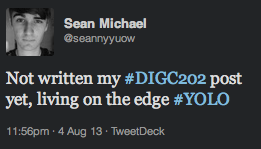Why #YOLO is still relevant.
Posted: August 5, 2013 | Author: seannygorman | Filed under: DIGC202 | Tags: hashtags, media, media convergence, networking, social networks, twitter, user empowerment, user-generated |8 CommentsThis is ridiculous right?! It’s 11.50pm on Sunday and I’m pretty sure this is either a really bad cold or I’m actually dying, and I have 10 minutes to post something up for DIGC202.
I’m sitting here thinking, ‘Well, damn, I have nothing to say. What a fantastic start to my semester.’ And then of course my immediate thought was, ‘I should tweet something about my lack of effort in order to amuse / make myself look bad-ass / allow myself to whinge to the world about how terrible my life is’.
And that’s when it hit me. That is networking, right there.
I could have tweeted: ‘Not written my #DIGC202 post yet, living on the edge #YOLO’ and I have just already formed several networks from just that. Anyone who already follows me on Twitter immediately, no matter where they are, has just been informed that I’m a lazy ass. Anyone who follows the #DIGC202 hashtag has also been informed, and they are looking through posts all collecting and collaborating together a whole community. A whole new society has been formed through the use of a hashtag!
And anyone looking through the #YOLO has also seen my tweet but is probably more concerned about the ridiculously stupid nature of anything else that has been tweeted with #YOLO. It’s a sad, sad world.
In the reading this week, Castells says that we “live in a network society” where networks define the boundaries of our society, and allows for social structures to develop in certain ways, to create communication, to halt communication and to integrate and exclude.
And that’s exactly what the hashtag on Twitter does. You can include yourself in the world of #DIGC202 or #YOLO, and it’s just one click away.
Before, I tweeted something about my ideas for the Final Project and was saddened that no one had replied, only to find that – stupid me – I had posted the tweet with an incorrectly spelled hashtag. Thus, as Castells explains, the networked society has excluded me from this network purely due to the rules that it has in place.
We are constantly being connected and networked with other people across the country and across the world. Write now I’m writing a blog post, while a couple of people inbox me on Facebook and another couple are texting me, all from varying locations, but all connecting with me over social networking tools.
And just for this subject alone, we have all connected up to several social networking sites to communicate and collaborate with another on a final project. And you really feel like you’re a part of something. And you may be just reading this right now because the Subject Outline told you that you had to comment on it. But the point is that at 11.59pm I uploaded a blog post on WordPress at my computer desk in my bedroom in my hometown of Ingleburn, and you, wherever you are on whatever platform you are reading this from, have found me because I posted a link to this blog post onto a social networking site and you found me through a single hashtag.
And this is why the #YOLO is still relevant.
Excruciating to think about, but relevant. Well, mostly just the hashtag element of it. I was just trying to make this sound poetic. Ruined it now. Thanks.
REFERENCES
Castells, M, 2004 ‘Afterword: why networks matter’, Network Logic: Who governs in an interconnected world? pp. 221-224.


Heck, good job! That totally made sense, and besides you’ve still explained what a network is! Well done.
I love this post – witty and informative. Thanks! And I don’t even do DIGC202, is that weird? (I am a BCM student though. Still weird?)
Thank you! Only slightly weird, but you get bonus points for being awesome 😀
This is so true! I love how you can write or comment about anything and you are connecting with such a large audience immediately. Also the way people are included and excluded by hashtaging topics, amazing!
It’s like the internet has allowed youth around the world to spread slang. I remember the slang that was popular in our groups at school and the internet has allowed popular slang from places like America to reach the world almost instantly. Its like when people used to say “Yewwww” all the time, if it became popular enough on the Internet you could almost guarantee that kids from all around the world would be using the same slang words. The world youth is becoming more and more integrated through the internet.
And I can’t believe there’s no mention of the originator (arguably) of YOLO
Strangely enough his name is DRAKE!
That’s because the post wasn’t really about the word YOLO at all. I could have replaced #YOLO with #RANDOMWORD and this post would have still made the same point.
Great post!